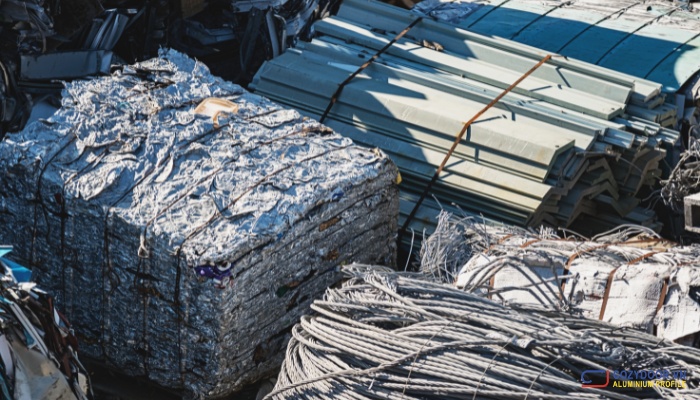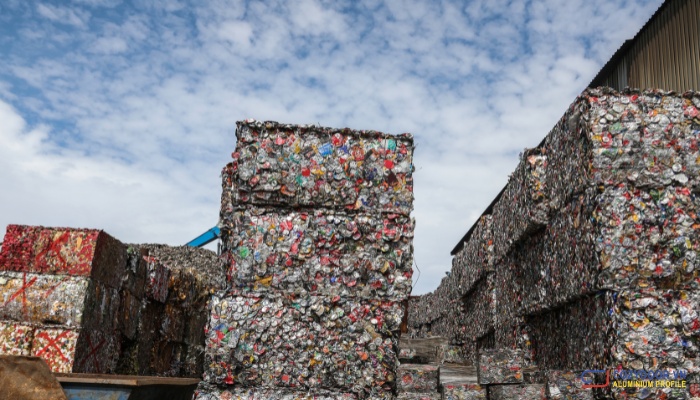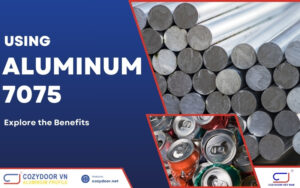In the fast-paced world of industrial construction, project managers and directors are constantly seeking ways to optimize efficiency, reduce costs, and minimize environmental impact. One often-overlooked opportunity lies in the recycling of alum. Yes, you read that right – alum can recycle! This seemingly simple act can have a profound impact on your projects, from boosting your bottom line to enhancing your company’s sustainability profile.
This comprehensive guide will delve into the hows, whys, and wheres of alum recycling, providing actionable insights and practical steps you can implement today. At Cozydoor, we’re committed to helping you build a greener, more profitable future.
The Importance of Recycling Aluminum in Construction
Aluminum is a cornerstone material in the construction industry, known for its durability, lightweight nature, and recyclability. With approximately 75% of all aluminum ever produced still in use, recycling plays a crucial role in maintaining its availability and reducing environmental impact. The recycling process saves up to 95% of the energy required for primary aluminum production, significantly lowering greenhouse gas emissions and contributing to a circular economy.
How to Recycle Alum at Home and in Your Community
Identifying Your Alum Type
Before embarking on recycling efforts, it’s essential to identify the type of aluminum you have. Common types include:
- Aluminum cans (beverages)
- Aluminum foil (food packaging)
- Aluminum sheets (construction materials)
Each type has different recycling processes and local regulations governing their disposal.
Preparing Alum for Recycling
To prepare aluminum for recycling:
- Clean the Material: Remove any food residue or contaminants from cans and foils.
- Sort by Type: Group similar materials together to streamline the recycling process.
- Flatten Cans: Crushing aluminum cans reduces space and makes transportation easier.
Finding Local Alum Recycling Centers
Utilize online tools or local waste management resources to find nearby recycling centers. Many communities have designated drop-off points for aluminum products.
Disposing of Alum at a Recycling Center
When visiting a recycling center:
- Ensure you follow any specific guidelines provided by the facility.
- Inquire about any fees or requirements for drop-off.
Reusing Alum at Home
Consider creative ways to reuse aluminum materials at home, such as:
- Crafting projects
- Garden decorations
- Storage solutions
Where to Recycle Alum
Recycling alum contributes to a larger effort toward sustainable resource management within the construction industry. Finding appropriate recycling facilities ensures your contribution to a healthier planet while potentially unlocking cost savings. Where can you recycle aluminum cans? What about larger quantities of industrial alum? This section will answer those questions and help you navigate the options.
Using Online Search Tools
Numerous online databases and search engines can help you pinpoint recycling facilities that accept alum in your region. These resources allow for quick and efficient searches, providing direct contact information and facilitating easy communication.
Contacting Local Waste Management
Your local waste management authorities are invaluable resources for identifying specialized recycling programs and guidelines for alum disposal. They can provide expert advice and connect you with relevant facilities, simplifying the recycling process.
Checking with Scrap Yards and Metal Recyclers
Scrap yards and metal recyclers may accept certain types of alum, offering an alternative disposal route. Reaching out to these facilities can uncover additional recycling options, further diverting waste from landfills.
Specialized Recycling Programs
Some regions offer specialized recycling programs tailored to specific types of industrial waste, including alum. Researching these programs can connect you with specialized facilities and enhance your recycling efforts.
Is All Alum Recyclable?
Not all alum is created equal. Understanding the different types is crucial for effective recycling. While alu can recycling in many forms, certain variations may require specialized handling. This knowledge ensures efficient recycling practices and prevents contamination issues.
Common Types of Alum and Their Recyclability
Potassium alum, ammonium alum, and soda alum are among the most common types. Each possesses different properties that influence its recyclability. Understanding these differences helps you make informed decisions about the appropriate recycling method.
Forms of Alum That Are Not Recyclable
Certain forms of alum, such as those heavily contaminated with other chemicals or mixed with incompatible materials, might not be suitable for standard recycling processes. Identifying these non-recyclable forms prevents contamination of the recycling stream and ensures efficient resource recovery.
Identifying Non-Recyclable Alum
Visual cues and basic tests can help determine whether your alum is suitable for recycling. Knowing what to look for allows for accurate sorting and prevents contamination of recyclable materials.
Read more Blog & New:
The Benefits of Recycling Alum
Recycling alum isn’t just good for the planet; it’s good for your bottom line. From aluminum can disposal to managing industrial alum waste, recycling reduces costs and improves your company’s image. By actively participating in alum recycling, you position your company as a leader in sustainable practices, attracting environmentally conscious clients and investors.
Reducing Landfill Waste
Landfills represent a significant environmental burden. By recycling alum, you directly reduce the amount of waste sent to these sites, minimizing your project’s environmental footprint and contributing to a healthier planet.
Conserving Natural Resources
The production of virgin alum requires significant natural resources. Recycling alum reduces the need for these resources, promoting conservation and reducing the impact of your construction projects on the environment.
Lowering Demand for Virgin Alum
By recycling aluminum can recycling, you actively contribute to a decreased demand for newly produced alum. This reduced demand translates to lower energy consumption and decreased greenhouse gas emissions, further minimizing your environmental impact.
Contributing to a Circular Economy
Recycling alum is a crucial step towards a circular economy, a system where resources are reused and repurposed rather than discarded. Embracing this model demonstrates your commitment to sustainable practices and positions your company as a responsible corporate citizen.
Potential Cost Savings
Recycling alum can generate significant cost savings compared to traditional disposal methods. These savings can be reinvested in your projects, enhancing your bottom line and creating additional value.
The Importance of Waste Reduction and the Role of Alum Recycling in a Sustainable Future
The Impact of Waste on the Environment
Waste generation has far-reaching consequences for the environment, contributing to pollution, resource depletion, and climate change. Understanding the full impact of waste motivates us to embrace recycling and adopt more sustainable practices.
Individual Actions for Waste Reduction
Small changes in individual habits can collectively make a significant difference. Educating your team about simple waste reduction strategies empowers them to contribute to a more sustainable work environment.
Promoting Sustainable Practices
Integrating sustainability into your company culture can have a profound impact on your projects and your bottom line. Promoting sustainable practices attracts environmentally conscious clients and demonstrates your commitment to responsible construction.
Future Innovations in Alum Recycling
The field of recycling is constantly evolving. Staying informed about emerging technologies and best practices in alum recycling allows you to optimize your waste management strategies and maximize resource recovery. At Cozydoor, we’re at the forefront of these developments, committed to providing you with the latest information and resources.
Conclusion: Alum can recycle
As leaders in industrial construction, embracing alum can recycle is not just an option; it’s an imperative for sustainable growth. By implementing effective recycling strategies, you can reduce costs, enhance project sustainability, and contribute positively to your community’s environmental goals.
To explore how Cozydoor can assist you with high-quality recycled aluminum supplies at competitive prices while meeting your project deadlines, please fill out your contact information below. Let’s work together towards a more sustainable future in construction!













How Aluminum Rolling Works: A Quick Overview for All
From sprawling factories and warehouses to modern shopping centers, aluminum’s [...]
Nov
Alum Can Recycle: Slash Construction Waste
In the fast-paced world of industrial construction, project managers and [...]
Nov
Power of Aluminium Die Casting
Are you a construction professional looking to optimize your projects [...]
Nov
7 Ways Aluminum Uses in Industry
Aluminum has become a cornerstone material across various industries, thanks [...]
Nov
Unlocking the Secrets of Aluminum Ore: What is Bauxite?
Cozydoor, your trusted partner in construction materials, is here to [...]
Nov
When Was Aluminum Discovered? A Brief History
Why should you care about the history of aluminum? Understanding [...]
Nov
A380 Aluminum Properties: 5 Ways to Slash Costs & Boost Project Timelines
Cozydoor recognizes the demands of your industry and is committed [...]
Nov
The Ultimate Guide to Aluminum Extrusion Dies
This comprehensive guide will equip you with the knowledge and [...]
Nov